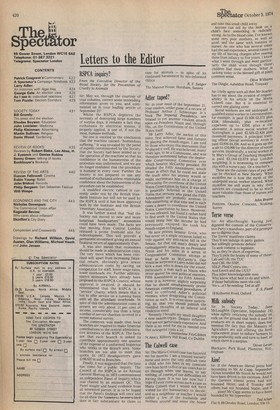RSPCA inquiry?
From the Executive Director of the Royal Society for the Prevention of Cruelty to Animals Sir: May we, through the courtesy of your columns, correct some misleading information given to you, and commented on in your leading article of September 21?
Whilst the RSPCA deplores the necessity of destroying large numbers of surplus dogs, it remains a fact that euthanasia by electrical means, if properly applied, is one of, if not the most, humane methods.
No one is entitled to the conclusion that the machine caused "horrendous suffering," It was revealed by the panel of experts commissioned by the Society that the Society had been misled as to the operation of the machine so that its, confidence in the humaneness of the procedure was undermined, and we are no longer confident that the procedure 440 is humane in every case. Further the Society is not prepared to use any method of euthanasia unless reasonable confidence about the humaneness of the procedure can be established.
A modified electric cabinet is currently under test by the British Standards Institute but will not be used by the RSPCA until it has been approved both by the Institute and the British Veterinary Association.
It was further stated that "had the Society not moved to new and more luxurious headquarters" economies could have been made. The facts are that moving from Central London released a prime freehold site for redevelopment. This will provide a permanent investment giving an annual financial return of approximately Vain.
It was also stated that economies should be made in administration costs. The very move which has been criticised will, apart from increasing financial return, obviously give lower administration costs by saving on competition for staff, lower wage rates, lower overheads, etc. Further administrative economies have already been proposed to the RSPCA Council, whose approval is awaited. It should be remembered that the RSPCA is a "service" charity, which means that it has to offer service on a running basis with all the attendant overheads. In spite of this the administration costs at present are only about 11 per cent of income, considerably less than a large number of service charities covered in a recent national survey. 431 The comment was made that local branches are required to make financial contributions to the central administra tive activities of the RSPCA. The facts are that each branch is asked to contribute approximately one quarter of the expense of a uniformed Inspector who works in the Branch area. Some branches are not able to meet this quota. In 1973 Headquarters gave £186,637 in aid to Branches.
Finally, it was suggested that the time has come for a public inquiry. The Council of the RSPCA at its Annual General Meeting in 1973 commissioned an independent Panel of Inquiry which was chaired by an eminent QC. This Panel sought and heard evidence from all interested parties. It is to be hoped that the Panel's findings will once and for all show the Soeiety-to be-arreavhirie does in fact substantiate its claim to care for animals — in spite of its continued harassment by mis-informed critics,
R. F. Seager The IVIanour House, Horsham, Sussex
































 Previous page
Previous page